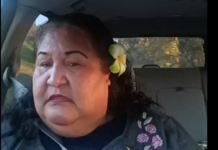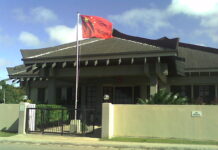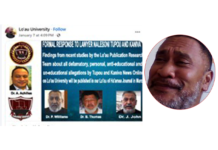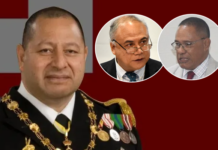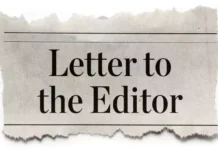Commentary – The Eke government’s justification for transferring Foreign Affairs to the King—that it simply reflects powers already vested in the crown by the constitution—is not only invalid but reveals a profound misunderstanding of the constitution’s democratic intent.

For 15 years now, since the promise of democratic reform in 2010, the people of Tonga have continued to struggle, still living with the illusion of a change that never fully arrived.
The democratic reforms were meant to transfer all of the King’s executive powers to the people’s elected representatives. If the 2010 transition failed to achieve this goal, then the system must be fixed to finally deliver on its promise of genuine democracy.
The justification for Eke’s controversial amendment to the constitution was recently revealed by the Minister of Police Piveni Piukala, during his weekly show on VPON media.
This defence relies exclusively on Tonga’s current constitution, which is famously condemned as the “most poorly written” among all the Commonwealth countries.
A key intention of the 2010 democratic reforms, according to King George V, was that the King’s power would no longer be exercised “at will” but “must be exercised solely on the advice of the Prime Minister.”
It was the king’s ambition that all executive branch structures must be accountable to Parliament.
As the Ministry of Foreign Affairs operates under this executive authority, it must—from a democratic perspective—remain under the control of people’s elected leaders who are accountable to taxpayers through Parliament.
The core democratic principle here is that the people must be able to scrutinise their leaders and hold them accountable for any misguided decisions made while overseeing a ministry funded by public money.
Therefore, the King, who is neither elected by nor accountable to the public, must not be involved in controlling any executive branch structures.
The unresolved royal scandals of the 1980s-2000s, which cost taxpayers millions, prove that the monarchy can no longer hold a role in the executive branch.
Authorising on flaw is flaw to authorise
Any legitimate attempt to amend the constitution—especially while the country is grappling with allegations of corruption among its leaders—must be grounded in the clear democratic precedent established by King George V.
The Eke government’s failure to anchor its actions in this historical promise reveals a troubling disregard for both constitutional principles and Tonga’s democratic trajectory.
King George’s democracy proclamation record provides the clearest rebuttal to the Eke government’s flawed justification.
During a comprehensive interview with Bruce Hill of ABC Radio Australia in 2010, the late King himself outlined the philosophical and practical foundations for transferring power to an elected government.
He made himself clear about the political pathway and his intention.
It began after King George Tupou I successfully staged a revolution against the Tu’i Tonga dynasty. Vowing to democratise the government, Tupou I introduced democratic principles to Tonga with the 1875 constitution, even while retaining key powers for the crown. This established a foundational balance between monarchy and popular representation.
Over a century later, and in the 2000s, King George V framed his historic reforms not as a break from this past, but as its ultimate fulfilment. He presented the act of relinquishing his executive powers not as a diminishment of the monarchy, but as the natural and necessary conclusion of his predecessor’s work, adapted for a modern era.
King George V’s Unfulfilled Democratic Promise
King George V articulated this profound connection between the original constitution and his democratic mandate clearly during his interview with Hill as follows:
“I think it’s the natural development of the original 19th century constitution. It’s an attempt to take the principles of that Constitution and apply them in 21st century idiom, which of course has to be democracy.
King George V did not see the democratic reform as a mere political ideal, but as a practical necessity for Tonga’s progress. He argued that for a nation to thrive, its system of government must evolve in lockstep with its economy. This belief was at the heart of his vision, as he explained:
“…I have always wanted to do this for the country, and it’s a very practical idea in that our political life has to travel at the same speed and same level as the development of our economic life.”
He firmly rejected calls from the nobility to revert to the old system, arguing that progress required a new path:
“People expressed to me their views … my fellow Nobility expressed to me their views, that perhaps Tonga was far better off as it was before under the old system. Well I had a simple answer to that … and that was, you can’t expect to keep repeating the same mistakes and expect a different result because that would be totally unreasonable.”
Crucially, King George viewed the new model not as a final product, but as a starting point that must be adapted over time, stating:
“Well what we have done is we have given it our best shot and said, this is the model we have come up with … that’s the present government and I. But I hope that in the future if the government or the parliament, find that what we’ve put up or what we’ve proposed is inadequate in any way that they will feel free to make the necessary adjustments …you know…. It’s not an unchangeable thing. I think our constitution should be kept alive with minor changes and adjustments to suit life … as the country progresses.”
Tonga must reclaim King George V’s democratic vision, and this is a call for his brother, King Tupou VI, to fulfil it. The only way to overcome a legacy of corruption allegations and royal scandals is to embrace a future of transparent and accountable governance.

